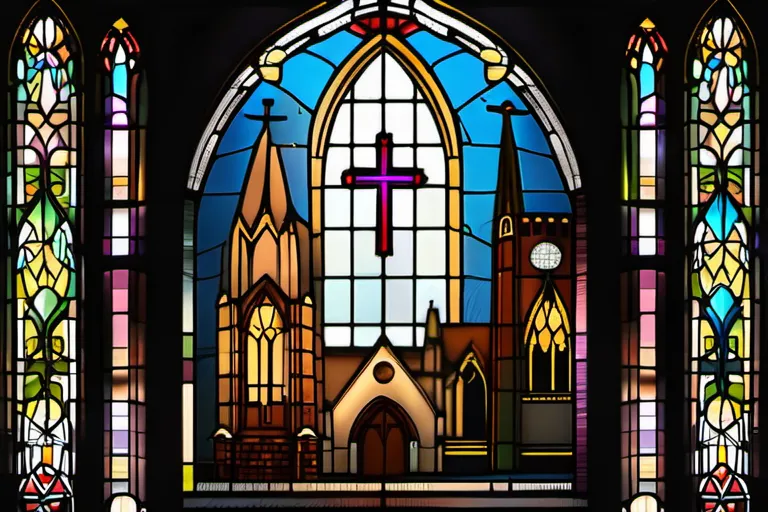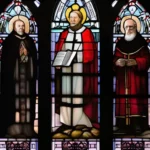Exploring the unique aspects of Anglicanism compared to other major world religions
Anglicanism, a branch of Christianity, shares many beliefs with other Christian denominations but also has distinct characteristics that set it apart. In this article, we will delve into the differences between Anglican beliefs and those of other major world religions.
The History and Origins of Anglicanism
The history of Anglicanism begins with a pivotal moment in 16th-century England, marking its birth from the Church of England’s break with the Roman Catholic Church during the reign of Henry VIII. But why did this split happen? Wasn’t it just about Henry’s desire for a divorce? It seems simple enough, but the roots run much deeper. This separation was more about political maneuvering and religious independence than personal matters alone.
Ancient manuscripts tell us that Anglicanism emerged from a unique blend of traditional Christian practices and English national identity. The Church of England aimed to find a middle ground between the strict Catholicism it rejected and the more Protestant reforms sweeping Europe. This position, often termed ‘via media,’ or “middle way,” allowed Anglicanism to evolve into a distinctive religious tradition.
Think of Anglicanism as a river branching out from its source. Just like how water can take different paths while still originating from the same place, Anglicanism has diversified over time. From the 16th century onwards, it absorbed influences from various sources, including the Reformation, Enlightenment thinking, and even modern democratic ideals. Each branch represents a distinct expression of Anglican belief and practice.
Through this evolution, Anglicanism developed its own distinctive liturgy and theology. For instance, the Book of Common Prayer, introduced by Archbishop Thomas Cranmer in 1549, became a cornerstone of Anglican worship. This book provided a shared language for prayer and sacraments, ensuring unity amidst diversity.
The story of Anglicanism is one of constant adaptation and reinvention. It’s like watching a tree grow; each new branch adds to the complexity but also enhances its beauty. The Church of England’s journey from reform to a global denomination reflects not just religious change, but also social and political transformations that shaped the world.
Thus, the history of Anglicanism is a dynamic narrative, filled with challenges, triumphs, and ongoing debates about identity and purpose. As we delve deeper into its beliefs, remember that every step forward was part of an enduring journey to find balance between tradition and innovation.
Anglican Beliefs: The Holy Trinity
Imagine standing at the crossroads of faith, where paths diverge into myriad beliefs. One such path is Anglicanism, which takes a unique approach to understanding the Holy Trinity. How does it compare to other Christian denominations? Is there a secret key that unlocks the heart of Anglican belief?
The Holy Trinity—Father, Son, and Holy Spirit—is central to Christianity. But how do Anglicans perceive this divine mystery? They see the Trinity as one God in three persons, each with distinct roles yet united in essence. This is a delicate balance, much like a trio of dancers moving in harmony while maintaining their individuality.
Unlike some traditions that emphasize the unity to the point where the distinctions between the persons are blurred, Anglicanism values these differences, seeing them as essential for full understanding and worship. It’s like having three different lenses through which one can view the same landscape—each offering a unique perspective while still portraying the same reality.
Moreover, Anglicans believe in the equality of the three persons but recognize their roles differently. The Father is seen as the source and authority; the Son as the redeemer who died for humanity; and the Holy Spirit as the one who empowers and guides. This hierarchical yet equal relationship mirrors a symphony orchestra where each instrument plays its part, contributing to the whole.
How does this compare with other denominations? In Catholicism, the Trinity is often seen through the lens of sacramental theology, where the trinitarian nature is expressed in rituals and symbols. In contrast, some Protestant churches focus on the individual experience, perhaps neglecting the corporate aspect of the Trinity. Anglicanism, however, finds a balanced middle ground.
Is this balance unique to Anglicanism? Or does it reflect a broader Christian understanding that has been lost or forgotten in certain traditions? The answer lies in the complexity and richness of the divine nature itself—a mystery that continues to fascinate and challenge believers across denominations.
As we explore these ideas, one can’t help but wonder: How do our perceptions of the Holy Trinity shape our understanding of God’s love and plan for humanity? And how might embracing Anglican perspectives deepen our own faith journeys?
The Role of Tradition in Anglicanism
The role of tradition in Anglicanism is like a deeply rooted tree that has seen countless seasons but stands firm and strong. Have you ever wondered how traditions shape a religious community? In Anglicanism, these traditions are not just old habits or customs; they are the heart and soul of the faith, giving it depth and resilience.
Unlike some other Christian denominations where strict adherence to tradition can sometimes feel like a rigid framework, Anglicanism embraces a more flexible approach. Here, tradition is seen as a guidepost rather than a straitjacket. It’s a way of finding common ground between history and contemporary understanding, blending ancient wisdom with modern insights.
Consider the concept of via media, or middle path, which defines Anglicanism’s approach to tradition. This idea suggests that Anglicans strive for balance in their beliefs and practices, not going too far one way or the other. It’s like walking along a riverbank where you can draw water from both sides – the rich heritage of the past and the fresh winds of today.
Anglican traditions are also known for their inclusiveness. Unlike some religions that might focus narrowly on certain practices, Anglicanism encourages engagement with a wide array of cultural and historical influences. It’s almost like a mosaic, where each piece – whether from Celtic Christianity or the Reformation – adds its unique color to the overall picture.
Moreover, the role of tradition in Anglicanism is not static but dynamic. Just as a river changes course over time, so too do traditions evolve within the church. This adaptability ensures that Anglicans can remain relevant and meaningful across different eras and contexts. It’s like a seed that grows into a tree, continually shedding its old leaves while sprouting new ones.
So, how does this compare with other Christian denominations? In many cases, they may have more rigid rules or less room for interpretation when it comes to tradition. Anglicanism, on the other hand, allows for a richer tapestry of belief and practice, weaving together the threads of history and the vibrancy of the present.
Understanding the importance of tradition in Anglicanism is crucial for grasping its unique identity. It’s not just about clinging to old customs but finding new ways to express faith that honor both the past and the future.
Anglican Beliefs: The Sacraments
When delving into the unique aspects of Anglican beliefs, one cannot overlook their sacramental theology. The Anglican Church recognizes seven sacraments, a practice that sets it apart from many other Christian denominations. But why these specific sacraments? Could they be seen as lifelines in the journey of faith?
Let’s explore the sacraments recognized by Anglicans and compare them to those of other major world religions. The Eucharist (or Holy Communion) is one of the most significant. For Anglicans, it symbolizes the body and blood of Christ, much like the way a river flows through a landscape, nourishing the earth around it. But how does this compare to, say, the practice in Eastern Orthodox churches, which view the Eucharist as a real presence of Christ?
Baptism is another crucial sacrament, often seen as the gateway to Christian life. It’s like planting a seed; once you bury it, it has the potential to grow into something beautiful and strong. However, in some traditions, baptism might be performed differently or viewed with a different symbolism.
- Confirmation follows, akin to the first steps taken by a young athlete as they prepare for their big race. It marks the transition from childhood faith to mature belief.
- Penance (or Reconciliation) allows for forgiveness and restoration, much like a doctor prescribing medicine for an ailment. It’s about healing and making things right again.
- Orders refers to ordination of clergy, setting aside individuals for specific roles within the church community.
- Matrimony celebrates marriage, another union that binds two souls together in love and commitment.
- Anointing of the Sick provides comfort and healing for the physically or emotionally ill. It’s a reminder that even when we’re weak, God is present to strengthen us.
By recognizing these sacraments, Anglicanism emphasizes the importance of ritual and ceremony in spiritual life, much like how a garden needs watering and care to thrive. Yet, this practice also contrasts with some Protestant traditions that focus more on personal faith than outward ceremonies. How do you see these differences impacting your own faith journey?
The Bible in Anglicanism
Imagine opening a book that has been used for centuries, one that holds the words of guidance and wisdom from the very essence of your faith. For Anglicans, this book is not just any ordinary text; it’s The Bible. But how does an Anglican approach to the Bible differ from other religious traditions? Let’s explore this intriguing question.
One might wonder why Anglicans prefer the King James Version (KJV) of the Bible. The KJV, with its poetic and majestic language, has a certain charm that resonates deeply within many Anglican hearts. But is it simply about the style or does it hold some deeper significance? Could it be that the KJV’s translations are seen as closer to the original texts, preserving their integrity and meaning over time?
Ancient manuscripts can often feel distant, like whispering secrets from a bygone era. For Anglicans, The Bible is more than just a collection of ancient documents; it’s a living, breathing guide that speaks directly to the soul. Yet, how do they navigate its complexities? Do they strictly adhere to one interpretation or embrace a multitude of viewpoints?
Anglican belief in the Bible as Scripture is nuanced. While other Christian denominations might see it as the final authority, Anglicans often interpret it alongside reason and tradition. This approach can lead to a rich tapestry of understanding, where each individual’s journey with the text is unique yet deeply rooted in shared beliefs.
In this exploration, we find that the Anglican approach to The Bible is like a river flowing through different landscapes. Sometimes it rushes with the force of its divine message, and at other times, it meanders gently, allowing for personal reflection and spiritual growth. This fluidity in interpretation makes the text accessible yet profound.
So, as we delve deeper into the heart of Anglican beliefs, let us not forget that The Bible is more than a book; it’s a journey of discovery, a path to understanding, and a source of comfort and guidance for millions. How do you see your relationship with The Bible? Is it just a sacred text or does it guide your daily life in unexpected ways?
Anglican Beliefs: The Role of Women and LGBTQ+ Individuals
When we delve into Anglican Beliefs, one cannot help but notice the evolving roles of women and LGBTQ+ individuals within this religious tradition. How do these roles compare to other Christian denominations? Why are these changes significant?
In Anglicanism, historically, the role of women has been limited in various aspects of church leadership. However, recent years have seen a push for greater inclusivity. Is it possible that the traditional barriers to female leadership are now beginning to crumble? The ordination of women as priests and bishops is a contentious issue, reflecting broader societal debates about gender equality. This change represents more than just a shift in personnel; it symbolizes a broader acceptance of diverse roles within the church community.
Similarly, the inclusion of LGBTQ+ individuals has been a significant area of development. Anglicans have long grappled with issues related to sexuality and faith. Does the inclusion of LGBTQ+ individuals signal a move towards a more inclusive and accepting approach? Some Anglican churches now support same-sex relationships and advocate for the ordination of openly gay clergy, challenging traditional views on marriage and family. These shifts reflect an ongoing dialogue about what it means to be faithful in a changing world.
In contrast, many other Christian denominations have taken more conservative stances on these issues. For example, some Evangelical churches still maintain strict prohibitions against the ordination of women and same-sex relationships. The Anglican approach often represents a middle ground, balancing tradition with modern perspectives.
The evolving roles of women and LGBTQ+ individuals in Anglicanism are not just about changing policies; they reflect a deeper understanding of love and inclusion. By embracing diversity, Anglicans hope to better serve their communities and offer a more compassionate message. Yet, these changes also raise questions about tradition and the balance between faithfulness and progress.
In exploring these topics, it becomes clear that the journey towards greater inclusivity is ongoing. The challenges faced by Anglicanism in these areas mirror those of wider society, prompting us to ask: How do we reconcile our beliefs with a world that is increasingly diverse and inclusive?
Conclusion
 By understanding the unique aspects of Anglicanism, we can appreciate its rich history and traditions while gaining a deeper understanding of the broader Christian faith.
By understanding the unique aspects of Anglicanism, we can appreciate its rich history and traditions while gaining a deeper understanding of the broader Christian faith.











